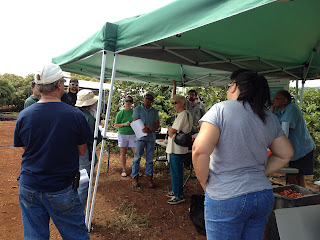Risk Management School: Kau
University of Hawaii at Manoa
College of Tropical Agriculture and Human Resources
Managing Ag Risk Through Ongoing Education & Collaborative Partnerships
Old Pahala Clubhouse
Corner of Kaalaki and Maile Streets, Pahala, Hawaii
Saturday, June 9, 2012
9 am -4:30 pm
Registration & trade show set up starts at 8am
Understanding Risk Issues for Ka’u Producers
Understand and mitigate agriculture risk- UHM CTAHR
Prepare for the 4 D’s-UHM CTAHR
High Risk Areas for Ka’u producers
Applicability of Crop Insurance to CBB & How to file a claim?
Grower Panel Discussion about crop insurance
Reimbursement Transportation Cost Program for Farms – USDA FSA
Hawaii County Ag Programs – County R&D
Marketing, Value Adding and Ag Tourism – Univ. of AZ V
alue Added Product – Volcano Winery
Trade show with agricultural chemical companies, agricultural government agencies (HDoA, USDA FSA, NRCS), and various CTAHR extension programs ( Sustainable and Organic Agriculture, Bee program, etc)
Registration and lunch are FREE. RSVP is required by May 31, 2012. A waitlist will be started once our maximum quota is reached. Please call Perci at 887-6183 to reserve your lunch and seat.
Directions:
Directions from Hilo: Travel towards Pahala on Hwy 11, turn right at Kamani Street. Turn left at Maile Street (just before Ka'u Gas Station). Continue straight. Clubhouse is on right hand side across from KAHU station on corner of Kaalaki and Maile Streets.
Directions from Kona: Travel towards Pahala on Hwy 11, turn left onto Maile Street. Clubhouse is on the first buildingon the left as you pass the corner of Kaalaki and Maile Streets.
The Local and Immigrant Farmer Education (LIFE) Program is a grant funded collaborative project between the UH College of Tropical Agriculture and Human Resources (UH-CTAHR), UH CTAHR Risk Management Program and the USDA, Risk Management Agency.
Open to everyone without regard to race, age, sex, color or disability. Educational activities are accessible for individuals with disabilities. For information or to request an auxiliary aid or service (e.g., sign language interpreter, designated parking, or materials in alternate format), contact Didi @ 887-6183 seven days before the training, activity, or event.
For more information, please contact Didi or Perci at (808) 887-6183.




















.jpg)
















